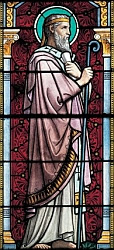DAILY INVENTORY
How easily we justify our rudeness toward others. We’re too busy to say “thank you” to the clerk in the mall. Our waitress took too long to refill our drinks, so we brusquely order without a “please.” Loving our neighbour as ourselves simply doesn’t apply to the man next door with the incessantly barking dogs.
In the middle of the night, a pastor was whisked away to the emergency room and promptly admitted into the hospital. His nervous wife, adult children and a long line of friends followed the pastor and the admitting nurse into the examining room. The nurse turned to the group and announced sternly, “Patient only; everyone else must go to the waiting room.” As the friends left the room, the shaken family informed the nurse in no uncertain terms that no one was going to make them leave, saying, “We’ll go to management if you try to make us leave our dad,” and “We want to make sure somebody takes care of him.”
As the nurse was asking the patient about his medical history, she questioned him about his occupation. The pastor lovingly glanced toward his wife and children and proudly announced that he had changed careers and was currently serving in ministry at a large, local church. The tension dissipated as the questionnaire was completed.
The nurse left the room to finish her duties, and the pastor’s wife quickly followed. She sincerely apologized for the family’s impulsive rudeness. The nurse, in turn, expressed regret for her severity and explained that she had never intended for the family to leave. She had simply felt it to be in the interest of the pastor to ask the many anxious friends to wait elsewhere. Through this brief interchange, a strong bond of mutual respect was formed between the two women. Throughout the pastor’s hospital stay, the nurse regularly updated the family about the tests, insisted that the wife and children rest, brought them coffee and, even when assigned to a different ward, spent her breaks checking in on the pastor and his family.
As you complete each day, you can get into the habit of asking your Higher Power, Jesus Christ, whether or not your actions throughout the course of the day displayed love for your neighbours.
“Reserve a daily time with God for self-examination, Bible reading and prayer in order to know God and his will for my life and to gain the power to follow his will”— You’ll live each day humbly—in reality, not in denial. You’ve done your best to amend your past. With God’s guidance, you can now make choices about the emotions that will affect your thinking and behaviour. You start to take action—positive action—instead of being stuck in a cycle of constant reaction.
we desire to grow daily in our new relationship with Jesus Christ and in our relationships with others. Instead of attempting to be in control of every situation and every person with whom we come into contact, or spinning out of control ourselves, we’re starting to exhibit self-control—to act and respond in the way God wants us to. Remember that “self under control” is our immediate aim but that our ultimate goal is self under God’s control.
Jesus has provided us with a daily checklist for our new lifestyle. It’s called the “Great Commandment,” and it’s found in Matthew 22:37–39: “‘Love the Lord your God with all your heart and with all your soul and with all your mind.’ This is the first and greatest commandment. And the second is like it: ‘Love your neighbour as yourself.’”
As you daily live out these two commandments by putting Principle Seven into action in your life, you’ll become more and more like Christ. You’ll become a doer of God’s Word, not just a passive hearer. James 1:22 instructs us: “Do not merely listen to the word, and so deceive yourselves. Do what it says.” Your actions need to be consistent with your talk. You, after all, maybe the only “Bible” someone else ever sees or hears. How does it feel to view yourself as a real-life “Living Bible”? That’s how the apostle Paul lived. As he expressed in 1 Thessalonians 1:5, “Our gospel came to you not simply with words, but also with power, with the Holy Spirit and with deep conviction. You know how we lived among you for your sake.” Others need to see God’s truth reflected in your life.
That can happen only if you spend time daily:
• with God completing your inventory;
• reading the Bible;
• praying in order to know God and his will for your life.
Take a Look:
• When did you last go out of your way to thank someone else? Do others see God’s truth reflected in your life?
• When has the practice of taking your daily inventory helped you in terms of your relationships?
• Do you build into your daily schedule a “quiet time” to read your Bible, pray and spend moments alone with God? What has God taught you in the past week?
• What does James 1:22 mean to you? How are you functioning as a “doer” of God’s Word?




























